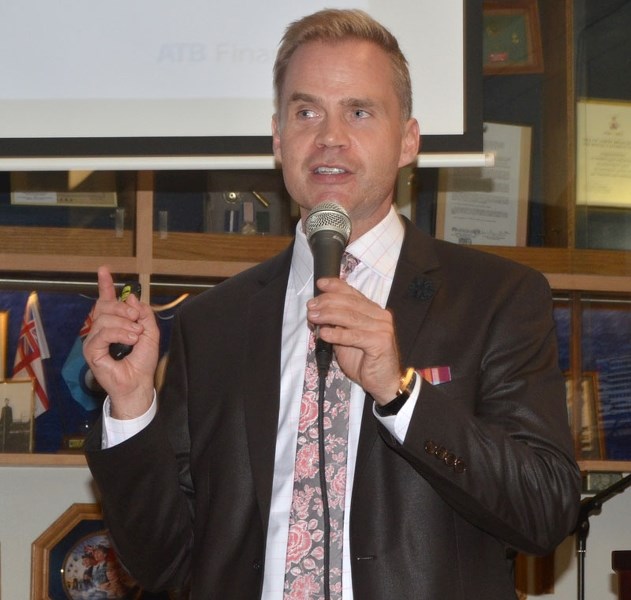While the economic woes in Alberta are leaving few unscathed, Cochrane might be better positioned to weather the storm, according to a Calgary economist.
Todd Hirsch, with ATB Financial, spoke at a Cochrane Rotary Club meeting at the Royal Canadian Legion on Monday. Although optimistic about Alberta’s future, he didn’t paint a rosy picture about what the province can expect over the next six months.
Hirsch said that he expects that period will yield the worst of the recession with more layoffs to come in the energy sector and those challenges trickling down into peripheral industries.
That is bad news for the province where the unemployment rate has skyrocketed to 7.8 per cent and Hirsch says it would not be a surprise to see it top out at nine per cent.
“If you’ve been in Alberta for 15 minutes you understand that the oil price is the dog that wags quite a few tails,” he said.
On the bright side, Cochrane, due its location and industry, might be slightly insulated compared to the harder hit areas such as Fort McMurray and even Calgary.
“Cochrane is in a bit of a bubble,” he explained. “Cochrane offers one of the best qualities of life.”
He described the town as a destination community, a launching pad to the Canadian Rockies, which will prop up community businesses as the low Canadian dollar is expected to bolster tourism and exports.
For the same reason, Cochrane’s connection to forestry and agriculture will also help cushion some of the blow. Hirsch said he expects both industries to do quite well this year. He went so far as to predict a record year for farmers, assuming Mother Nature co-operates.
On the national front, Hirsch said the country put up promising numbers in January with a .6 per cent growth in Real Gross Domestic Product. While he doesn’t expect that rate of growth to be a month-over-month trend – which would result in an annual growth of five per cent – he said it demonstrates a reason for optimism.
“Even if we get two to 2.5 per cent, it would be a lot better than what we have been seeing,” he said.
Looking to the future, Hirsch said there are a lot of opportunities for Albertans despite the recent hardship.
In 20 years, he predicts Alberta’s population, thanks to natural growth and international migration to top 6 million. In addition, he said the economy will be much more diverse than it is today. Alberta will also benefit from a population that is healthier, better educated and younger on average than the rest of Canada.
He also reminded people that the province has seen its share of recessions and expects that in the years to come it will experience two to three more, going by the average seven-year cycle between low points.
With governments pushing for low-carbon economies and a prediction that oil prices will likely not see the record highs of the past few years, Hirsch said there is an opportunity for Alberta to capitalize on its engineering prowess.
Those skills could help exploit renewable energies, especially the province’s geothermic potential. The oil and gas industry’s drilling knowledge, combined with the scientific advances in nano-technology, Hirsch said could open the door for underground electricity generation.
In essence, Hirsch told the crowd, whose questions ranged from government spending to the risk to consumer spending as the population ages, that there is a light at the end of the tunnel. While it might seem dire now, there are opportunities to be had, he added.
“In the downturns is when the best deals are made,” he said.




